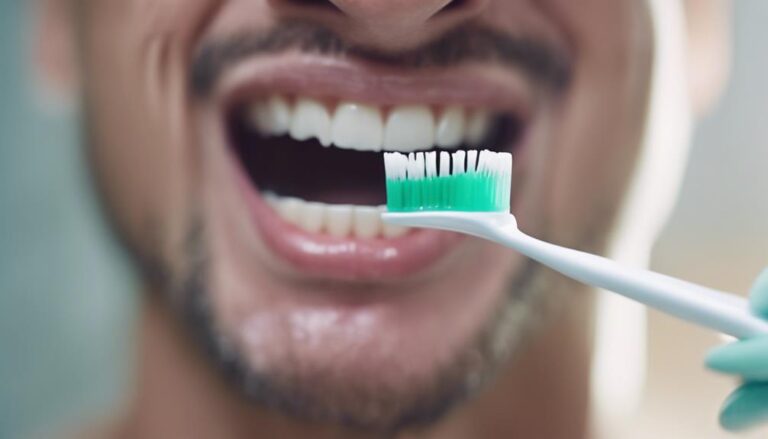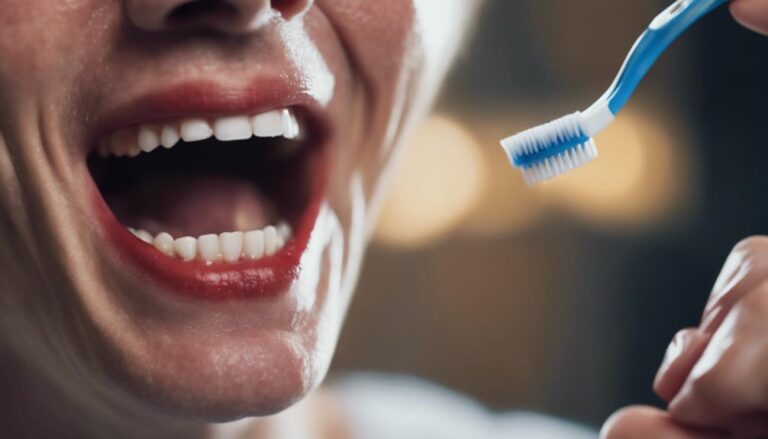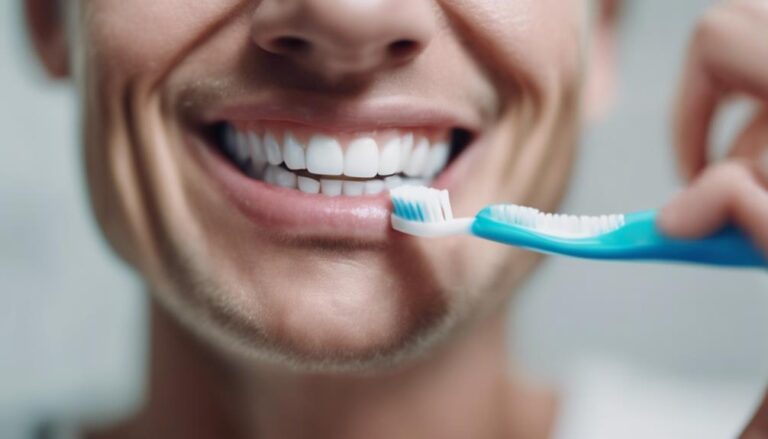Gum disease triggers bad breath by allowing stinky bacteria to thrive, emitting foul-smelling sulfur. Inflamed gums create pockets where bacteria breed, disrupting the mouth’s natural balance and causing malodor. Plaque buildup near the gums worsens halitosis, while receding gums expose more surfaces for bacterial growth. If you’re curious about how to tackle this issue and learn more about maintaining fresh breath, stick around for valuable insights.
Key Takeaways
- Gum disease causes gum inflammation, leading to bad breath.
- Bacteria in periodontal pockets release foul-smelling compounds.
- Chronic gum infections contribute to persistent oral odor.
- Untreated periodontitis exacerbates halitosis.
- Managing gum health is crucial for combating bad breath.
Bacterial Plaque and Bad Breath
Why does bacterial plaque contribute to bad breath?
Bacterial plaque plays a significant role in causing bad breath due to its ability to harbor odor-producing bacteria. When oral hygiene is neglected, bacterial growth in the mouth increases, leading to the formation of plaque – a sticky film that accumulates on teeth. This plaque provides an essential environment for anaerobic bacteria to thrive, producing volatile sulfur compounds responsible for the foul smell associated with bad breath.
Maintaining good oral hygiene practices is vital in preventing bacterial plaque buildup. Regular brushing and flossing help remove food particles that bacteria feed on, reducing their growth and the subsequent production of malodorous compounds. Additionally, using antibacterial mouthwashes can further inhibit bacterial growth and control bad breath.
Understanding the relationship between bacterial plaque and bad breath underscores the importance of proper oral care. By implementing effective oral hygiene routines and seeking professional dental cleanings, individuals can combat bacterial plaque, minimize bad breath, and promote overall oral health.
Inflammation in the Gums
Inflammation in the gums, often caused by the presence of bacterial plaque, can lead to serious oral health complications if left untreated. When gums become inflamed, they can recede, creating pockets where bacteria thrive, potentially leading to gum disease and bad breath. To prevent gum inflammation and maintain excellent gum health, consider the following:
- Effective Oral Hygiene: Brushing teeth at least twice a day with fluoride toothpaste and flossing daily helps remove plaque and prevent gum inflammation.
- Regular Dental Visits: Scheduling regular dental check-ups allows for professional cleaning to remove plaque and tartar buildup that can contribute to gum inflammation.
- Healthy Lifestyle Choices: Avoiding tobacco products and consuming a balanced diet rich in vitamins and minerals can support gum health and reduce inflammation.
Periodontal Pockets and Halitosis
Periodontal pockets, along with the presence of bacteria in the mouth, can contribute to the development of halitosis, commonly known as bad breath. These pockets form when the gums pull away from the teeth, creating spaces where bacteria can thrive. The depth of these pockets is a vital indicator of gum health. Deeper pockets provide a more hospitable environment for bacteria, leading to increased production of volatile sulfur compounds (VSCs) responsible for the foul odor associated with bad breath. Maintaining excellent oral hygiene is key to preventing the formation and progression of periodontal pockets.
| Importance of Pocket Depth | |
|---|---|
| Shallow Pockets (<3mm) | Healthy Gums |
| Moderate Pockets (4-6mm) | Early Stage of Gum Disease |
| Deep Pockets (>7mm) | Advanced Gum Disease |
Regular visits to a dentist for professional cleanings, proper brushing and flossing techniques, and using antimicrobial mouthwashes can help reduce pocket depth and the associated risk of halitosis. Remember, addressing periodontal pockets through good oral hygiene practices is essential in combating bad breath.
Gingivitis and Oral Malodor
Gingivitis, a common early stage of gum disease, often contributes to the unpleasant issue of oral malodor. As a periodontal condition affecting gum health, gingivitis can lead to persistent bad breath if left untreated.
Here are three key points to bear in mind regarding the relationship between gingivitis and oral malodor:
- Important Oral Hygiene: Inadequate brushing and flossing can allow plaque to build up along the gumline, leading to gingivitis. This build-up of bacteria-rich plaque can produce foul-smelling compounds that contribute to bad breath.
- Gum Inflammation: Gingivitis is characterized by red, swollen gums that are more prone to bleeding. These inflamed gums create an environment where bacteria thrive, releasing volatile sulfur compounds responsible for malodor.
- Bacterial Imbalance: When gingivitis disrupts the balance of bacteria in the mouth, anaerobic bacteria can proliferate. These bacteria break down proteins and release sulfur compounds, resulting in the characteristic odor associated with bad breath.
Maintaining good oral hygiene practices is essential in preventing gingivitis and the oral malodor it can trigger.
Plaque Build-up and Odor
Plaque build-up along the gumline is a common precursor to oral malodor, playing a major role in bad breath. This sticky film is formed by bacteria, food particles, and saliva, which can irritate the gums and lead to gum disease if not removed effectively. To combat plaque and its associated odor, proper oral hygiene practices are vital. Brushing twice a day with a fluoride toothpaste, flossing daily, and using an antimicrobial mouthwash can help prevent plaque accumulation and maintain fresh breath.
Effective plaque removal techniques include using a soft-bristled toothbrush to gently brush along the gumline and between teeth, ensuring all surfaces are cleaned thoroughly. Regular dental check-ups are also essential to detect and remove any hardened plaque, known as tartar, which can’t be removed by regular brushing alone.
In addition to good oral hygiene practices, incorporating minty remedies like sugar-free gum or mints can temporarily mask bad breath odors. However, these aren’t substitutes for addressing the root cause of plaque build-up through consistent plaque removal techniques and gum disease prevention.
Gum Recession Causes Bad Breath
Gum recession can contribute to the development of bad breath by exposing more of the tooth’s root surface, creating an environment where bacteria can thrive and cause odor. This occurs because as the gums recede, pockets form between the teeth and gum line, providing a perfect hiding spot for bacteria to accumulate. Here are three ways gum recession can lead to bad breath:
- Increased Bacterial Growth: Gum recession exposes more surface area of the tooth, allowing bacteria to multiply rapidly in the gaps, leading to the release of foul-smelling gases.
- Poor Oral Hygiene: Difficulty in cleaning areas where the gums have receded can result in inadequate plaque removal, contributing to bacterial growth and bad breath.
- Potential Inflammation: Gum recession can lead to inflammation and infection, causing a persistent bad odor due to the presence of harmful bacteria in the affected area.
Maintaining good oral hygiene practices and seeking professional dental care can help prevent gum recession and its associated effects on oral health and bad breath.
Tartar Formation and Halitosis
Regular dental cleanings play an essential role in preventing tartar buildup, a common contributor to halitosis. Tartar, also known as dental calculus, is a hardened plaque that forms on teeth when plaque, a sticky film of bacteria, mineralizes over time. This hardened deposit provides a rough surface for bacteria to thrive, leading to an increase in odor-causing compounds and ultimately bad breath.
Tartar removal through professional cleanings is vital in halitosis prevention. Dental hygienists use specialized tools to scrape away this stubborn buildup, reducing the bacterial load in the mouth and improving oral hygiene. Additionally, maintaining good oral hygiene practices at home, such as regular brushing, flossing, and using antimicrobial mouth rinses, can help prevent tartar formation and subsequent bad breath.
Bleeding Gums and Bad Breath
To effectively address the issue of bad breath caused by bleeding gums, it’s essential to understand the relationship between gum health and oral malodor. When gums bleed, it’s often a sign of underlying gum disease, which can contribute to the development of bad breath. Here are three key points to keep in mind:
- Gum health: Bleeding gums are usually a result of inflammation caused by the buildup of plaque, a sticky film of bacteria. This bacterial presence leads to irritation and bleeding of the gums, creating an environment where odor-producing bacteria thrive.
- Oral hygiene: Proper oral hygiene practices, such as regular brushing, flossing, and professional cleanings, are vital in preventing and addressing bleeding gums. Good oral hygiene can help remove plaque and bacteria, reducing the likelihood of gum inflammation and bad breath.
- Regular dental visits: Scheduling routine dental check-ups is important for maintaining gum health. Dentists can detect early signs of gum disease, provide professional cleanings, and offer personalized advice on oral care to prevent bleeding gums and associated bad breath.
Gum Infections and Oral Odor
The prevalence of gum infections correlates substantially with the occurrence of oral odor, underscoring the importance of maintaining excellent oral health practices. Gum infections, often stemming from untreated gum disease, can lead to unpleasant oral odor due to the accumulation of bacteria and debris in the pockets formed between the gums and teeth. To prevent gum infections and consequent oral odor, prioritizing gum disease prevention and oral health maintenance is vital.
Effective gum disease prevention involves consistent oral hygiene practices such as brushing teeth twice a day, flossing daily, and using antimicrobial mouthwash. Regular dental check-ups are also essential to detect gum disease early and prevent its progression. Additionally, maintaining a balanced diet low in sugary foods and beverages can help reduce the risk of gum infections.
Incorporating these habits into a daily routine can greatly reduce the likelihood of gum infections and the associated oral odor, promoting overall oral health and fresh breath.
Saliva Production and Halitosis
How does saliva production impact the occurrence of halitosis, commonly known as bad breath? Saliva plays an essential role in maintaining oral health, including preventing malodor. Here’s how:
- Saliva composition: Saliva is composed of water, electrolytes, mucus, and enzymes that aid in digestion and protect the oral cavity. An imbalance in saliva composition, such as reduced flow or changes in pH levels, can contribute to halitosis by allowing bacteria to thrive and produce foul-smelling compounds.
- Hydration levels: Adequate hydration is vital for saliva production. When hydration levels are low, saliva production decreases, leading to dry mouth. Dry mouth creates an environment where bacteria proliferate, causing malodor. Therefore, staying hydrated is crucial in preventing halitosis.
- Oral hygiene: Proper oral hygiene habits, such as regular brushing, flossing, and using mouthwash, can help stimulate saliva production and maintain a healthy oral environment. These practices aid in reducing bacteria in the mouth, preventing the buildup of plaque, and ultimately combating halitosis.
Mouth Bacteria and Malodor
As we explore the connection between saliva production and halitosis, it becomes evident that the composition of mouth bacteria greatly influences malodor. Maintaining a healthy bacterial balance within the oral microbiome is vital for preventing bad breath. The oral cavity houses a diverse array of bacteria, some of which are beneficial for oral health, while others can contribute to malodor. When there’s an imbalance in the oral microbiome, with an overgrowth of harmful bacteria, the production of volatile sulfur compounds increases, leading to bad breath.
Proper oral hygiene practices, such as regular brushing and flossing, help control bacterial growth and maintain a balanced oral microbiome. Additionally, using antimicrobial mouthwashes can target and reduce the levels of odor-causing bacteria in the mouth. Seeking professional dental cleanings and check-ups can also aid in keeping the oral microbiome in check.
Understanding the role of bacterial balance in the oral microbiome is essential for addressing malodor at its root cause. By promoting a healthy oral environment, we can effectively combat bad breath and maintain excellent oral health.
Gum Tissue Degradation and Bad Breath
To comprehend the link between gum tissue degradation and bad breath, we must explore the intricate relationship between oral health and malodor. Maintaining excellent gum health is vital for ensuring breath freshness. Here are three key points to ponder:
- Gum Health Impact: Gum tissue degradation, often stemming from untreated gum disease like gingivitis or periodontitis, can lead to pockets forming around the teeth. These pockets harbor bacteria, plaque, and food particles, contributing to foul-smelling breath.
- Bacterial Growth: As gum health deteriorates, the environment becomes more conducive for bacterial growth. These bacteria release volatile sulfur compounds, causing the unpleasant odor associated with bad breath.
- Inflammation and Odor: Inflamed gum tissue due to degradation not only creates discomfort but also exacerbates bad breath. The inflammatory process releases compounds that mix with oral bacteria, intensifying malodor.
Understanding the impact of gum tissue degradation on breath freshness underscores the importance of proactive gum health management in combating bad breath.
Poor Oral Hygiene and Halitosis
Inadequate oral hygiene practices greatly contribute to the occurrence of halitosis, commonly known as bad breath. Neglecting proper oral care routines allows bacteria to thrive in the mouth, leading to the production of foul-smelling compounds that cause bad breath. Brushing teeth alone may not be sufficient; the tongue’s surface can harbor bacteria that contribute greatly to halitosis. Incorporating tongue scraping into daily oral hygiene can help remove these bacteria, reducing the likelihood of bad breath.
Additionally, oral probiotics have shown promise in combating bad breath. These beneficial bacteria can help restore a healthy balance in the oral microbiome, inhibiting the growth of odor-causing microbes. By introducing good bacteria, oral probiotics can support overall oral health and potentially reduce halitosis.
To effectively address bad breath stemming from poor oral hygiene, a thorough approach that includes proper brushing techniques, tongue scraping, and the use of oral probiotics may be beneficial. Emphasizing these practices in daily oral care routines can greatly improve breath freshness and overall oral health.
Gum Disease Progression and Bad Breath
The progression of gum disease can greatly contribute to the presence of bad breath. When gum disease advances, it creates an environment in the mouth that promotes the growth of odor-causing bacteria, leading to persistent bad breath. To prevent this issue, maintaining good oral hygiene habits is essential.
Here are three key steps to prevent gum disease progression and subsequent bad breath:
- Regular Brushing and Flossing: Brushing your teeth at least twice a day and flossing daily helps remove plaque buildup, preventing gum disease development.
- Routine Dental Check-ups: Regular visits to the dentist for professional cleanings and check-ups can catch gum disease early and prevent it from worsening.
- Healthy Lifestyle Choices: Avoiding tobacco products, maintaining a balanced diet, and staying hydrated can all contribute to overall oral health and gum disease prevention.
Chronic Bad Breath From Gum Issues
Chronic bad breath resulting from gum issues indicates an underlying oral health concern that requires attention and proper management. When gums are affected by chronic inflammation, a condition commonly known as periodontitis, the persistent odor associated with bad breath can become a prevalent issue. The bacteria thriving in the pockets formed between the gums and teeth due to inflammation release volatile sulfur compounds, causing the unpleasant smell. It’s essential to address this chronic inflammation promptly to prevent further damage to the gums and surrounding structures.
Individuals experiencing chronic bad breath linked to gum problems should seek professional dental care to assess the extent of gum disease and develop a tailored treatment plan. This typically involves deep cleaning procedures like scaling and root planing to remove plaque and tartar buildup that contribute to gum inflammation. Additionally, maintaining good oral hygiene practices at home, such as brushing twice a day, flossing, and using an antiseptic mouthwash, can help control the bacterial overgrowth causing the persistent odor. Early intervention and consistent oral care are vital in managing chronic bad breath originating from gum problems.
Frequently Asked Questions
Can Bad Breath From Gum Disease Be Contagious to Others?
Yes, bad breath from gum disease can be contagious to others. Bacterial spread through close contact or shared items can transmit the odor. Maintaining good oral hygiene, avoiding close contact when symptoms are present, and regularly visiting the dentist can help prevent transmission.
Is There a Link Between Gum Disease and Heart Problems?
There’s a strong link between gum disease and heart problems. Poor dental hygiene can impact cardiovascular health. Taking care of oral health is vital in reducing the risk of heart disease. It’s important to prioritize dental care for overall well-being.
How Can Smoking Affect Bad Breath Caused by Gum Issues?
When it comes to bad breath caused by gum issues, smoking cessation is vital. Smoking hinders gum health and worsens bad breath. Maintaining excellent oral hygiene, including regular brushing, flossing, and dental check-ups, is essential for combating the effects of smoking on bad breath.
Can Certain Medications Worsen Bad Breath Related to Gum Disease?
I felt like my breath could knock out a charging bull! Some medications can worsen bad breath linked to gum disease. Understanding the medication impact is essential. Explore treatment options and the medication connection to manage this issue effectively.
Are There Specific Foods That Can Help Improve Bad Breath From Gum Problems?
To improve bad breath due to gum issues, incorporating dietary solutions like fresh fruits and vegetables can help. Natural remedies such as drinking green tea can also be beneficial. Proper oral hygiene habits, like regular brushing and flossing, are essential.
Conclusion
To sum up, if you want to have breath that could peel paint off the walls, just ignore your gum health! Let that bacterial plaque build up, let inflammation run rampant in your mouth, and watch as your breath becomes a force to be reckoned with.
But if you’d rather avoid the embarrassment of chronic bad breath, maybe consider taking care of your gums and practicing good oral hygiene. Just a thought.






